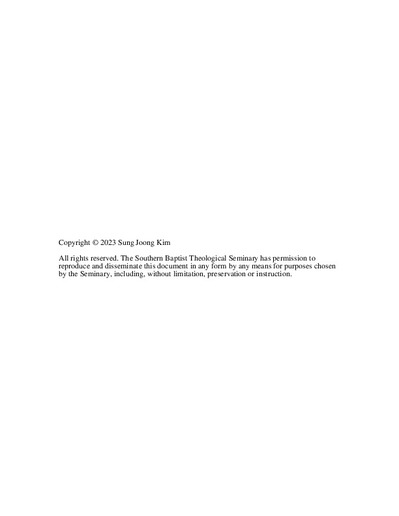| dc.description.abstract | Very little has been written on the themes of divine grace and human responsibility for salvation in the book of Revelation. This dissertation argues that the conquering motif, conveyed by the verb νικάω and grounded in the theme of Old Testament holy war, serves as an effective soteriological framework through which to analyze the intricate relationship between divine grace and human responsibility in salvation as understood within the context of the symbolic thought-world of Revelation. The rationale for this argument is that the concept of salvation in Revelation is generally understood in terms of “victory.”
Chapter 1 introduces the thesis, history of research, and methodology. Chapter 2 examines all three instances of νικάω occurring in reference to Christ’s victory (3:21; 5:5; 17:14) and portraying Christ as the divine warrior (the Son of Man, the slain lamb, and the warrior lamb/divine warrior), suggesting that the conquering of Christ is to be interpreted as the warring activity of divine warrior. However, such images as the “exalted Christ,” the “slain lamb,” and “robe dipped in blood” reinterpret his warring activity in terms of his death and resurrection, indicating that Christ’s death and resurrection are the primary means through which the salvation of God’s people is achieved. Each occurrence of νικάω performs a specific soteriological function: initiation of salvation (5:5), motivation in the present (3:21), and consummation of salvation (17:14), indicating that salvation, from beginning to end, is a matter of divine grace.
Chapters 3–5 address human responsibility in salvation. Chapter 3 lays an interpretive foundation for how to analyze the notion of human responsibility expressed by the application of conquering language to believers (2:7, 11, 17, 26; 3:5, 12, 21; 21:7). The burden of this chapter is to demonstrate that the nature of human responsibility for salvation is not mere human work but the external proof of one’s inner saving faith. Chapter 4 builds on this foundation by thoroughly analyzing 12:11 and 15:2, where νικάω occurs in reference to believers’ conquering, and demonstrating how believers’ victory, while a human act, is divinely enabled through Christ’s victory. Chapter 5 investigates the role of the Spirit in salvation, focusing on how the Spirit applies Christ’s accomplished victory to believers, enabling them to conquer and consequently inherit final salvation.
Chapter 6 probes the central role of the Old Testament holy war tradition in shaping the concept of salvation as victory in Revelation, arguing that in light of the typological relationship between the Old and New Testaments, Revelation contains the two essential typological ideas drawn from the monergistic pattern of holy war and uses them to shape its ideas of divine grace and human responsibility in salvation. These two basic ideas are: (1) God fights on behalf of his people with no human involvement, showing that God’s saving grace is monergistic; (2) faith on the part of God’s people is the sole requirement for them to win victory. These ideas are carried over into the conquering of Christ and that of believers. Chapter 7 synthesizes the study’s findings. | en_US |

